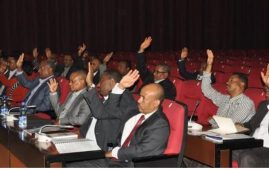“South Sudan does not recognize, and I underline does not recognize, the content of the 1959 [Nile Water] agreement”. These were the words, last week, of South Sudan’s Water and Irrigation Minister Paul Mayom. In further proof of the growing consensus on Nile matters throughout the region, South Sudan has expressed its opposition to the controversial 1959 Nile water agreements between Sudan and Egypt. The Minister explained that “having been under Sudan at the time, we could not say anything: today we say we have nothing to do with this agreement”.
Following a recent visit to South Sudan by a high profile Egyptian delegation led by Prime Minister Hisham Qandil reports surfaced of a possible agreement between the two countries on the Nile. However, Mr. Mayom underlined that the two countries had only signed Memoranda of Understanding on education, agriculture and investment, not on the Nile. Mr. Mayom also highlighted South Sudan’s recent accession to the Nile Basin Initiative (NBI) pointing out that the country’s membership in the organization was further proof of its commitment to “reasonable and equitable utilization of Nile water resources”. He emphasized that “having joined the NBI [we] are already a long way towards joining the Cooperative Framework Agreement”. The Cooperative Framework Agreement has already been signed by Ethiopia, Kenya, Uganda, Rwanda, Tanzania and Burundi, a majority of the Nile Basin countries. Mr. Mayom suggested that Egypt and Sudan’s persistent refusal to ratify the agreement was because it negated the widely disregarded Nile Waters agreement of 1959 which gave a disproportionate share of the water to the two countries. According to those agreements, Egypt received 51 billion cubic meters per year while Sudan had a share of 18 billion annually, essentially giving the two countries sole rights to the water at the expense of the rest of the Basin.
In response to Mr. Mayom, his Egyptian counterpart, Mohammed Bahaa el-Din, described the move as a show of hostility as South Sudan had not notified Egypt of its intention to sign the Cooperative Framework Agreement. Egypt has consistently defended its historic rights to the Nile’s water by arguing that both the 1959 agreement, as well as a 1929 colonial accord, stipulated that the approval of all Nile Basin states must be gained before the implementation of any projects along the river. However, the position of CFA signatory countries on this has always been quite clear. No agreements written and ratified under British colonial rule can be admissible today, as the countries on whose behalf Britain signed those agreements have now gained their independence and are not party to those agreements. Nor indeed was Ethiopia.
Mr. Mayom’s comments on South Sudan’s position came on the heels of the official launch of a new Nile Basin Initiative project, the Nile Cooperation for Results (NCORE). The project, which was announced at the recently convened 38th Nile Technical Advisory Committee (Nile-TAC) meeting at the NBI Secretariat in Entebbe, Uganda, was developed to strengthen platforms and knowledge-based analysis of trans-boundary options for sustainable basin-wide cooperative planning, management and development of member states’ water resources. As part of the NBI, South Sudan is among the countries set to benefit from this two-year $15.3 million project, funded by the German government, the NBI trust fund and the Cooperation in International Waters in Africa (CIWA), a trust fund administered by the World Bank.
According to the NBI Secretariat, “the NCORE project is the first phase of the five-year Nile Basin Climate Resilient Growth Program (NBCRG) supported by a number of donors and a constituent part of NBI’s overarching five-year strategic plan for the period 2012-2016”. The project will be implemented in three components, focusing on advancing Nile Basin-wide cooperation and analysis, promotion of sustainable development and planning in the Nile Equatorial Lakes region, as well as dam safety related initiatives. The Executive Director of the NBI Secretariat, Teferra Beyene, added that “efforts are underway, with the help of our development partners, to ensure the full implementation of the five-year strategic plan.”
This underlines the growing regional consensus on the utilization of the Nile River’s water as partnership across the Basin continues to increase. And as Mr. Mayom said, it can be hoped that South Sudan’s expected ratification of the CFA will act as a catalyst for more comprehensive and substantive cooperation along the Nile.
****************
* Originally published on A Week in the Horn of the Ministry of Foreign Affairs – on March 29, 2013 issue, titled “South Sudan and regional consensus along the Nile”. Items from A Week in the Horn are re-published here with a permission to do so.
Check the archive for related posts.





